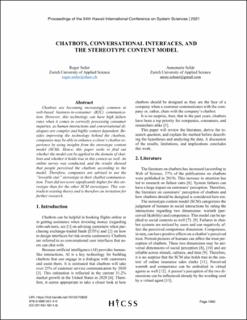Please use this identifier to cite or link to this item:
https://doi.org/10.21256/zhaw-21508| Publication type: | Conference paper |
| Type of review: | Peer review (publication) |
| Title: | Chatbots, conversational interfaces, and the stereotype content model |
| Authors: | Seiler, Roger Schär, Annemarie |
| et. al: | No |
| DOI: | 10.21256/zhaw-21508 10.24251/HICSS.2021.227 |
| Proceedings: | Proceedings of the 54th Hawaii International Conference on System Sciences |
| Page(s): | 1860 |
| Pages to: | 1867 |
| Conference details: | 54th Hawaii International Conference on System Sciences (HICSS), Grand Wailea, HI, USA, 5-8 January 2021 |
| Issue Date: | 2021 |
| Publisher / Ed. Institution: | University of Hawai'i at Manoa |
| Publisher / Ed. Institution: | Honolulu |
| ISBN: | 978-0-9981331-4-0 |
| ISSN: | 2572-6857 |
| Language: | English |
| Subjects: | Chatbot; Social robot; Stereotype content model; Trust |
| Subject (DDC): | 006: Special computer methods 658.8: Marketing management |
| Abstract: | Chatbots are becoming increasingly common in web-based business-to-consumer (B2C) communication. However, this technology can have high failure rates when it comes to correctly processing consumer inquiries, as human interactions and conversational di-alogues are complex and highly context dependent. Besides improving the technology behind the chatbots, companies may be able to enhance a client’s chatbot experience by using insights from the stereotype content model (SCM). Hence, this paper seeks to find out whether the model can be applied to the domain of chat-bots and whether it holds true in this context as well. An online survey was conducted, and the results showed that people perceived the chatbots according to the model. Therefore, companies are advised to use the “loveable star” stereotype in their chatbot communication. Trust did not score significantly higher for this stereotype than for the other SCM stereotypes. This contradicts existing theory and is therefore an invitation for further research. |
| URI: | https://digitalcollection.zhaw.ch/handle/11475/21508 |
| Fulltext version: | Published version |
| License (according to publishing contract): | CC BY-NC-ND 4.0: Attribution - Non commercial - No derivatives 4.0 International |
| Departement: | School of Management and Law |
| Appears in collections: | Publikationen School of Management and Law |
Files in This Item:
| File | Description | Size | Format | |
|---|---|---|---|---|
| 2021_Seiler-Schaer_Chatbots-Conversational-Interfaces-and-the-Stereotype-Content-Model.pdf | 359.61 kB | Adobe PDF |  View/Open |
Show full item record
Seiler, R., & Schär, A. (2021). Chatbots, conversational interfaces, and the stereotype content model [Conference paper]. Proceedings of the 54th Hawaii International Conference on System Sciences, 1860–1867. https://doi.org/10.21256/zhaw-21508
Seiler, R. and Schär, A. (2021) ‘Chatbots, conversational interfaces, and the stereotype content model’, in Proceedings of the 54th Hawaii International Conference on System Sciences. Honolulu: University of Hawai’i at Manoa, pp. 1860–1867. Available at: https://doi.org/10.21256/zhaw-21508.
R. Seiler and A. Schär, “Chatbots, conversational interfaces, and the stereotype content model,” in Proceedings of the 54th Hawaii International Conference on System Sciences, 2021, pp. 1860–1867. doi: 10.21256/zhaw-21508.
SEILER, Roger und Annemarie SCHÄR, 2021. Chatbots, conversational interfaces, and the stereotype content model. In: Proceedings of the 54th Hawaii International Conference on System Sciences. Conference paper. Honolulu: University of Hawai’i at Manoa. 2021. S. 1860–1867. ISBN 978-0-9981331-4-0
Seiler, Roger, and Annemarie Schär. 2021. “Chatbots, Conversational Interfaces, and the Stereotype Content Model.” Conference paper. In Proceedings of the 54th Hawaii International Conference on System Sciences, 1860–67. Honolulu: University of Hawai’i at Manoa. https://doi.org/10.21256/zhaw-21508.
Seiler, Roger, and Annemarie Schär. “Chatbots, Conversational Interfaces, and the Stereotype Content Model.” Proceedings of the 54th Hawaii International Conference on System Sciences, University of Hawai’i at Manoa, 2021, pp. 1860–67, https://doi.org/10.21256/zhaw-21508.
Items in DSpace are protected by copyright, with all rights reserved, unless otherwise indicated.